
World
20:10, 23-Oct-2017
Did Saudi Crown Prince make a secret visit to Israel?
By Abhishek G Bhaya
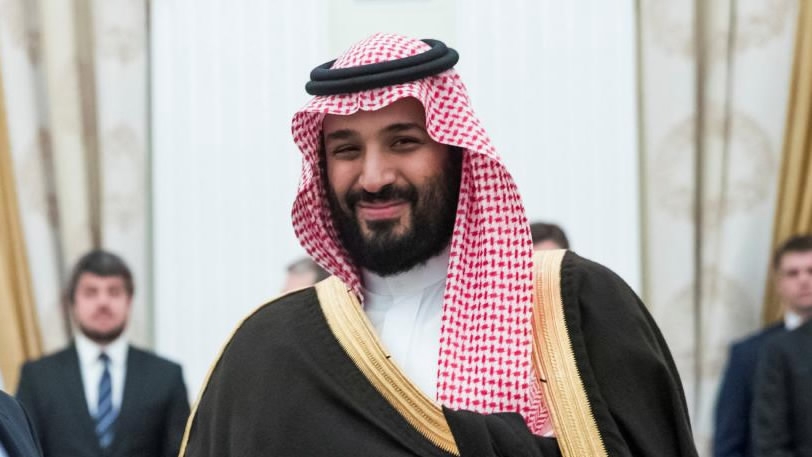
An Israeli radio report last month suggesting Saudi Crown Prince Mohammed bin Salman visited Israel discreetly has prompted eager speculations in the Israeli and Arab media over the purported warming up of ties between Riyadh and Tel Aviv. Without official diplomatic relation though, the two countries share mutual concerns over Iran’s growing presence in regional affairs.
After over a month-long media hype, Saudi Arabia on Sunday attempted to put a lid on the alleged reports denying any of its officials had visited Israel.
"Reports of a secret visit to Israel by a Saudi official which have appeared on some media are unfounded," a spokesman for the Saudi foreign ministry said in a statement carried by the official SPA news agency. "Saudi Arabia has always been transparent as regards contacts and visits [to foreign countries],” he added.
Media speculations
Rumors about the “secret visit” started making the rounds after Israel Radio's diplomatic correspondent covering Arab affairs, Simon Aran, posted a tweet in Arabic on September 7, saying: “A Saudi Prince has visited Israel secretly, met with senior Israeli figures and discuss with them pushing forward regional peace!. [Officials] refused to comment on the news.”
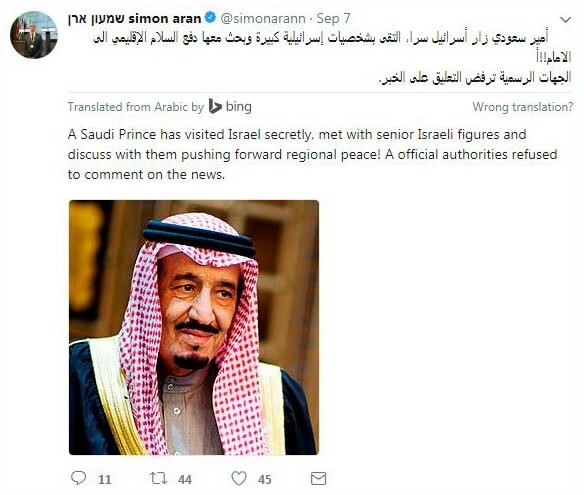
A day later, Aran tweeted, this time in Hebrew: “The Crown Prince of Saudi Arabia criticized Israel… and secretly met with Israeli officials to promote the regional peace initiative.”
Israel Radio’s Arabic-language channel reported the visit adding, “The prime minister and foreign ministry offices refused to comment on this matter.”
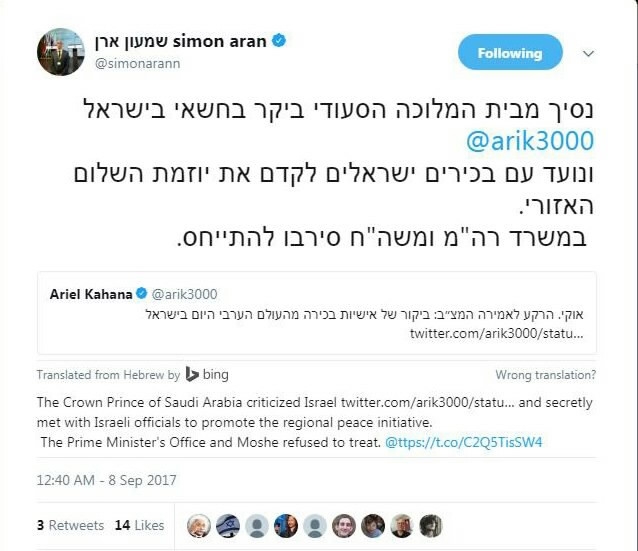
Soon, more reports in Israeli media and a prominent Saudi blogger claimed that it was indeed the powerful Saudi crown prince who had visited Tel Aviv. Journalist Ariel Kahana, who works for the nationalist and right-wing weekly Makor Rishon, in a tweet on September 10, cited a UAE report that quoted a “spokesman for the heir to the throne” to bolster the claims.
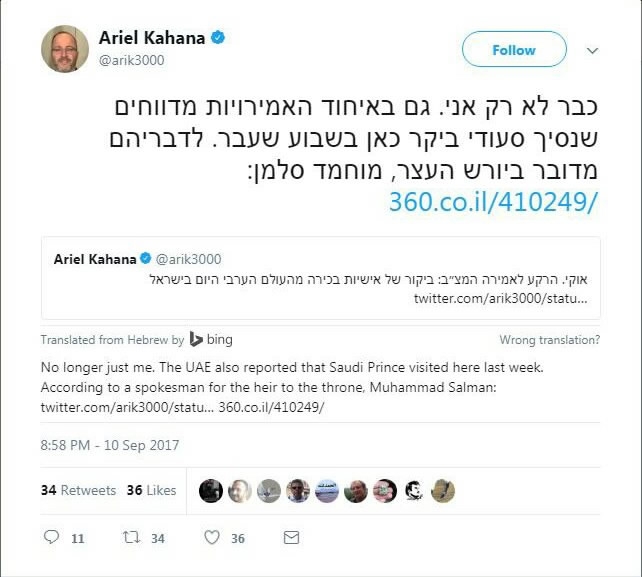
Noted Saudi blogger “Mujtahid” wrote: “The journalist Noga Tarnopolsky, a specialist in Israeli affairs who possesses international credibility, has confirmed Mohammed bin Salman’s visit to Israel.”
Last Friday, Iran’s Press TV and London-based Middle East Monitor claimed that an Israeli official confirmed Mohammed’s visit to Tel Aviv. Both the outlets cited an Israeli official telling this to AFP’s Arabic service on condition of anonymity. AFP however, reported that Israeli officials never offered any confirmation.
The latest reports were the ones that drew an official Saudi response denying the claims.
United against Iran
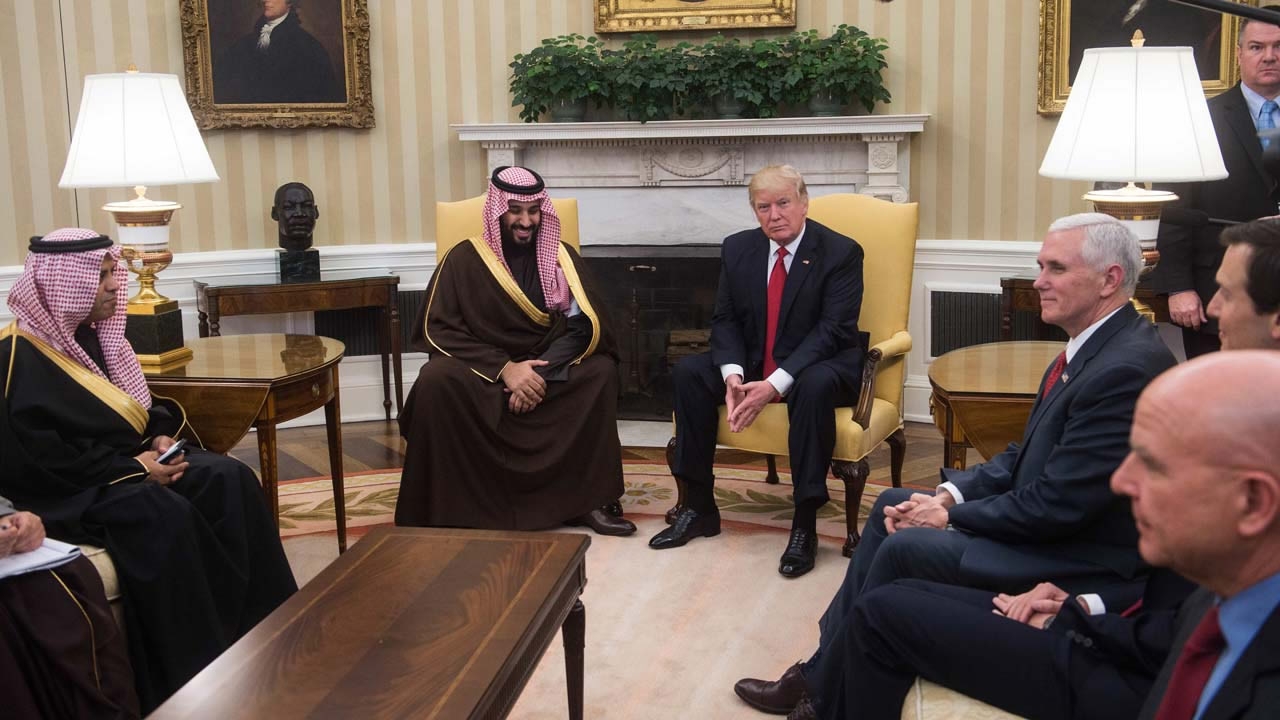
US President Donald Trump and then-Saudi Deputy Crown Prince and Defense Minister Mohammed bin Salman speak to the media in the Oval Office at the White House in Washington, DC, March 14, 2017. /AFP Photo
US President Donald Trump and then-Saudi Deputy Crown Prince and Defense Minister Mohammed bin Salman speak to the media in the Oval Office at the White House in Washington, DC, March 14, 2017. /AFP Photo
While Saudi Arabia and most Arab countries do not formally recognize Israel, there are signs the shared concerns over Iran are pushing Riyadh and Tel Aviv closer. Since Israel was established in 1948, only two Arab states - Egypt and Jordan - have signed peace deals with the country.
Prince Mohammed bin Salman, who is just a step away from being crowned the Saudi king, is known to hold a hawkish view of Iran.
Mohammed has ruled out dialogue with Tehran and pledged to protect his conservative kingdom from what he called Tehran’s efforts to dominate the Muslim world.
Earlier in March, Mohammed met US President Donald Trump at the White House where they noted the importance of “confronting Iran’s destabilizing regional activities.”
Last week, in an interesting turn of event both Israel and Saudi Arabia congratulated Trump after he declared he would not certify the 2015 Iran nuclear deal.
"I think there are two issues that the president was concerned with and we're all concerned with, and coincidentally on this, Israel and the leading Arab states see eye-to-eye," Israeli Prime Minister Benjamin Netanyahu said. "When Israel and the main Arab countries see eye-to-eye, you should pay attention, because something important is happening," he added.
Netanyahu also described relations with the Arab world as the "best ever" last month, without delving into details.
Even though the Jewish state is viewed with intense hostility in the Arab countries, Israel is increasingly being seen as a potential ally against Iran.
"[Relations are still] under the radar and unofficial because the culture of the Middle East is sensitive [to this matter],” AFP quoted Israeli Communications Minister Ayoub Kara as saying.
Uzi Rabi, a Tel Aviv University professor who specializes in Saudi Arabia, told AFP that there seemed to be "coordination" on issues including seeking to limit the spread of Iranian influence in the region. "There are Saudis meeting Israelis everywhere now, functioning relations based on shared interests," Rabi said.
Kristian Ulrichsen, a professor focused on Gulf affairs at Rice University in the US, felt that ties between Israel and Arab countries are driven by a shared threat from common enemies.
Israel and Saudi Arabia are also perceived to have common objective in Syria as they are opposed to the Bashar Assad government.
US push for Israel-Arab ties
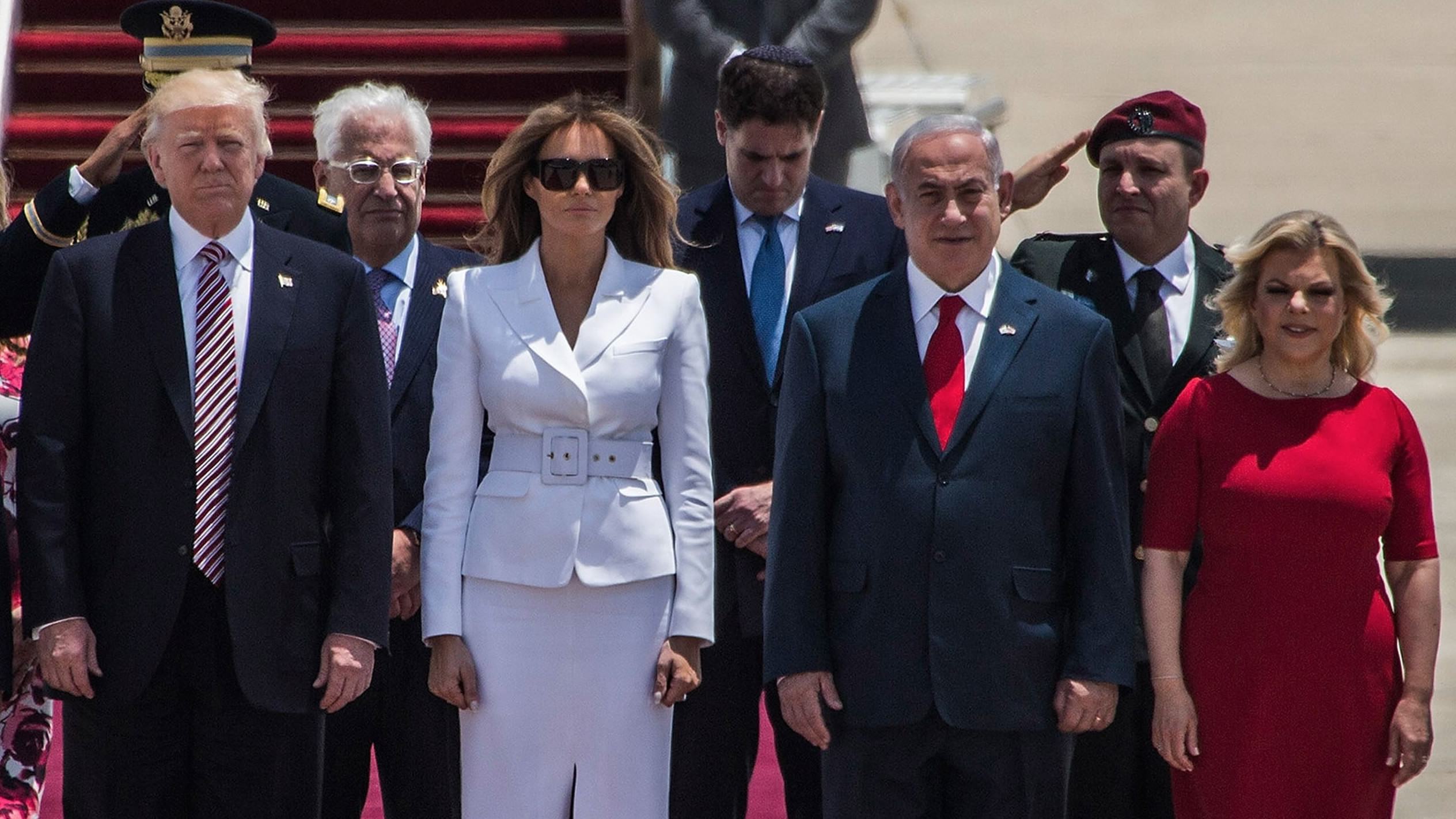
US President Donald Trump and first lady Melania Trump are welcomed by Israeli Prime Minister Benjamin Netanyahu and his wife Sara at Ben Gurion International Airport in Tel Aviv, May 22, 2017. /AFP Photo
US President Donald Trump and first lady Melania Trump are welcomed by Israeli Prime Minister Benjamin Netanyahu and his wife Sara at Ben Gurion International Airport in Tel Aviv, May 22, 2017. /AFP Photo
The US, under Trump administration, is also looking to promote links between Israel and the Arab world, with a hope that regional interests could lead to an Israeli-Palestinian peace deal.
This May, Trump took a rare direct flight from Saudi Arabia to Israel during his visit to the Middle Eastern countries.
"There is tremendous will, really good feeling, towards Israel," Trump said of Saudi Arabia upon arrival in Israel. "What's happened with Iran has brought many other parts of the Middle East towards Israel."
In 2002, Saudi Arabia proposed a peace initiative offering Arab countries' recognition of Israel in return for Israel's withdrawal from territories occupied in 1967 and the creation of a Palestinian state. The plan never saw the light of the day.
There are no indications yet to suggest Arab states are ready to formally recognize Israel.
While the current level of links between Riyadh and Tel Aviv remain hush-hush, observers believe that back-channel talks may pave the way for a more overt acknowledgement of ties.
An AFP report cited the example of influential Saudi billionaire arms dealer Adnan al-Khashoggi, who was said to have had a relationship with Israel’s then-defense minister Ariel Sharon in the 1980s.
While an open rapprochement between Saudi Arabia and Israel seems like a distant dream owing to the chequered history of Middle East politics, Ulrichsen said in the meantime, he does ”expect economic and security ties to become more open in the months and years ahead.”
(With input from agencies)

SITEMAP
Copyright © 2018 CGTN. Beijing ICP prepared NO.16065310-3
Copyright © 2018 CGTN. Beijing ICP prepared NO.16065310-3